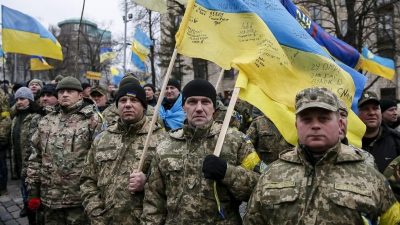Ukraine Receiving Weapons and “Military Instructors” from NATO

All Global Research articles can be read in 51 languages by activating the “Translate Website” drop down menu on the top banner of our home page (Desktop version).
To receive Global Research’s Daily Newsletter (selected articles), click here.
Visit and follow us on Instagram at @crg_globalresearch.
***
Once again, the West seems to be investing in aggressive maneuvers in Ukraine, promoting an unnecessary escalation of tensions and heightening instability in Eastern Europe. In an alleged reaction to the non-existent Russian “invasion plan”, NATO appears to be sending armed militants into Ukrainian territory, disguising them as military instructors. The militarization of Ukraine is an extremely dangerous attitude, considering the current anti-Russian racist ideology that drives the attitudes of the Kiev’s pro-Western government, which results in more and more violence day after day.
In a recent statement, Maria Zakharova, official spokeswoman of the Ministry of Foreign Affairs of Russia, said that NATO countries are signing several multi-billion-dollar contracts with Ukraine with the supposed aim of improving the country’s defense potential in the face of possible “threats” coming from Moscow – considering that both NATO and Kiev endorse the conspiracy theory of a “Russian invasion plan”. These were some of her words during a recent interview:
“The region, in particular Ukraine, is being pumped up with weapons. I am speaking about direct supplies, contracts for future, multimillion, multibillion contracts. Moreover, militants are being sent there under the guise of military instructors”.
It is still unclear what role will be played by such suspected NATO militants or advisers on Ukrainian soil, but much speculation can be made considering the current political and social reality of Ukraine. They can work with the various neo-Nazi gangs and paramilitary militias serving the Ukrainian government. It is very possible that there is some move in the sense of trying to create a Ukrainian unified force, bringing together government soldiers, militiamen and private agents, and that NATO is, in its provocative plans, encouraging this type of organization by sending advisory missions.
Historically, the country that most sponsors anti-Russian paranoia in Ukraine is the US, but now new NATO actors are willing to get into the game. For example, Turkey has expanded its actions in Kiev with the aim of creating tensions with Russia. Ankara and Moscow have increased their frictions recently, mainly due to Turkish support for the deployment of NATO bases in the post-Soviet central Asian space and Turkey’s destabilizing action in the Nagorno-Karabakh crisis. As a result, the Turkish government has boosted its activities with other NATO powers to foment tensions and instability on the Russian western border.
Washington and Ankara are currently committed to militarizing Ukraine and conveying a message of security and cooperation to Zelensky’s pro-Western government. Various military equipment of American and Turkish origin has been deployed on Ukrainian soil, including air vehicles (such as the famous Turkish drones Bayraktar) and anti-missiles systems (such as the American Javelines), as well as an enormous communication and intelligence apparatus. Last week, the US government approved a 300 million dollars military aid package for Ukraine. In addition, another 20 million dollars is being invested by the US in a specific project to strengthen the border security service in Ukraine. Similar aid has also come from the UK and the European Union. Turkey still helps in a more veiled way, without announcing large packages of economic aid, but it has been ready to send more and more weapons and agents.
This kind of “help” coming from the West creates a false sense of stability and security for Ukraine. NATO acts very simply: it invents the threat (in this case, the so-called “Russian invasion plan”) and proposes its own solution. The Ukrainians believe that they are really being threatened by Russia and that is why they are increasingly asking for help from the West, which fills Ukraine with militants and military equipment and encourages Kiev to act more and more aggressively on the border. Indeed, the Ukrainian government appears to have full confidence that, if the situation ever really gets worse and a conflict does arise, NATO will immediately come to help and neutralize any threat. But this is a very dangerous illusion.
Ukraine’s role in the NATO security scheme is to serve as an agent provocateur and destabilize the Russian strategic environment. Kiev has no value to the West beyond what it can do to harm Moscow. NATO allocates weapons and militants on Ukrainian soil and encourages conflict, but this goes up to a certain limit. No NATO country would risk going to war with Russia to save Ukraine – which is not even part of the alliance. Luckily for the Ukrainians, Russia has another strategic plan, which does not include any act of violence against Kiev. But if such a conflict were really about to happen, surely all Western “help” would cease immediately, with NATO troops retreating and the Ukrainians having to deal alone with a combat situation in which they have no chance of winning.
*
Note to readers: Please click the share buttons above or below. Follow us on Instagram, @crg_globalresearch. Forward this article to your email lists. Crosspost on your blog site, internet forums. etc.
Lucas Leiroz is a researcher in Social Sciences at the Rural Federal University of Rio de Janeiro; geopolitical consultant.
Featured image is from Crisis Group

